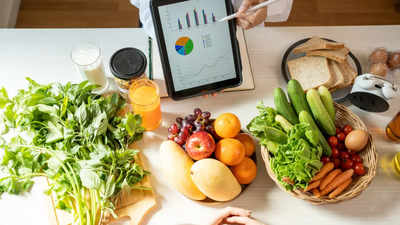Trending
4 foods that cause cancer and 4 foods that can help prevent it
Cancer prevention involves dietary and lifestyle choices, including avoiding carcinogenic foods and embracing cancer-fighting options. Processed meats, sugary foods, fried foods, and alcohol should be minimized, while cruciferous vegetables, nuts, fatty fish, and fiber-rich foods can help reduce cancer risks.
Cancer is a multifactorial disease influenced by your genetic, metabolic, lifestyle and environmental factors. Hence, building a diet around cancer-fighting foods as well as limiting carcinogenic foods can tilt the odds in your favor in preventing this most dreaded disease. To fare even better, you should opt for alround lifestyle changes, spanning not only diet, but exercise, yoga, stress management, meditation, breathwork etc, preferably based on genetic tests that are personalized.
While certain foods have been scientifically linked to increased cancer risk, others are known for their protective properties. Understanding which foods to avoid and which to embrace can empower you to make healthier choices for yourself and your family. Here, I will present 4 foods and their nutrients that are research-validated to offer maximum protection against various cancers, as well as 4 carcinogenic foods that you should minimize or avoid in your diet to effectively prevent cancer.
4 foods that raise cancer risk
Processed Meats: Hot dogs, bacon, sausages, and other processed meats are increasingly found in modern diets, but they come with significant cancer risks. The World Health Organization (WHO) has classified processed meats as a Group 1 carcinogen - a category denoting substances proven to cause cancer in humans, due to the presence of nitrates, nitrites, HCAs & PAHs. Long-term consumption has been linked to colorectal cancer, the second leading cause of cancer-related deaths worldwide.

Sugary Foods and Beverages: While sugar is not a carcinogen, consuming sugary foods and drinks contributes to obesity, which is a major risk factor for multiple cancers, including breast, liver, and pancreatic cancer. The insulin spikes caused by high sugar intake can also promote the growth of cancer cells, as many cancers thrive in high-glucose environments. Obesity caused by excess sugar intake leads to chronic inflammation, a known cancer promoter.
Fried and Charred Foods: Deep fried favorites like French fries, fried chicken, and even grilled foods with blackened edges are known to harbor acrylamide, a chemical that forms when starchy foods are cooked at high temperatures. Acrylamide has been classified as a potential human carcinogen by the International Agency for Research on Cancer (IARC), as it damages DNA and causes cell mutations. Regular consumption of fried and charred foods has been linked to higher rates of gastrointestinal and esophageal cancers.
Alcohol: Alcohol consumption is a well-established risk factor for various cancers, including those of the mouth, throat, esophagus, liver, breast, and colon. Even moderate drinking has been shown to increase cancer risk, as alcohol is metabolized into acetaldehyde, a carcinogenic compound that damages DNA and interferes with cell repair. Alcohol also increases estrogen levels, which is linked to breast cancer.

4 foods that prevent cancer
Cruciferous Vegetables: Cabbage, broccoli, cauliflower, kale and other cruciferous vegetables are proven to prevent cancer most effectively. These vegetables are rich in glucosinolates, compounds that break down into biologically active molecules like sulforaphane, which have potent anti-cancer properties. Sulforaphane acts by neutralizing carcinogens and by protecting cells from DNA damage. Their regular consumption is associated with a reduced risk of breast, lung, colorectal, and stomach cancers.
Nuts, Raisins & Berries: Almonds, raisins, blueberries, strawberries, raspberries, and blackberries are packed with antioxidants, particularly vitamins, resveratrol, anthocyanins, ellagic acid etc. Antioxidants neutralize free radicals, reducing DNA damage, and helping fight oxidative stress, which is a key driver of cancer development. Natural supplements like Natural E and Natural C are easy sources. Studies suggest that nuts, raisins & berries may help prevent cancers of the mouth, esophagus, and colon.

Fatty Fish: Salmon, mackerel, sardines, and other fatty fish are rich in Omega-3s and vitamin D, both of which have anti-inflammatory and cancer protective effects. While Omega-3 fatty acids suppress cancer causing inflammation, Vitamin D regulates cell growth and differentiation, helping to prevent abnormal cell proliferation. These beneficial fatty acids are linked to lower risk of colorectal, breast, and prostate cancers.
Fibre Rich Foods: Vegetables like carrots and beetroots, fruits like mangoes and guavas, as well as whole grains like ragi, oats, millets etc are rich in fibre, which plays a crucial role in preventing cancer. Fibre promotes a healthy gut microbiome, which has been linked to reduced cancer risk. They also contain cancer protective antioxidants like selenium and lignans. High-fiber diets are associated with a lower risk of colorectal and stomach cancers.

Contributed by: Dr. Sujith SR, Senior Medical Officer, Vieroots Biohack Centre
Get real-time updates on Budget 2025 and Income Tax Slabs on Times of India. Check out the latest income tax slabs FY 2025-26.
End of Article
FOLLOW US ON SOCIAL MEDIA
Visual Stories
Tired of too many ads?go ad free now





















